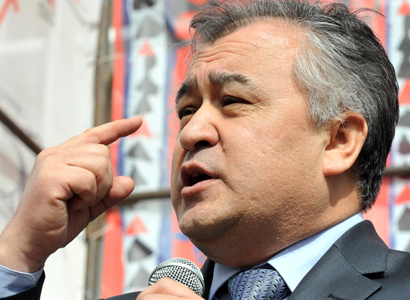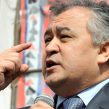
Russian And Foreign TV Censored During Election Period In Kyrgyzstan
Publication: Eurasia Daily Monitor Volume: 8 Issue: 199
By:

Kyrgyzstan’s voters will choose their next president on October 30. Contrary to earlier expectations, the campaign period was rather orderly and uneventful. Both international and local observers have so far concluded that all competing candidates had equal access to the media and were able to campaign in a free political environment.
Yet, some of the limitations of the campaign season imposed by parliament are largely overlooked. Except for the Organization for Security and Cooperation in Europe (OSCE) and a few Kyrgyz journalists, most observers avoided criticism concerning parliament’s decision to ban live broadcasting by foreign channels for the period of the presidential campaign (www.24.kg, October 7). The law is primarily directed against preventing the Russian media from influencing public opinion before the elections.
The Head of the Ata-Meken Party Omurbek Tekebayev, who claims his party suffered from negative reporting by Russian media before last year’s parliamentary elections, was the primary initiator of the law. As a result of this legislation, all providers of cable TV featuring foreign channels were forced to broadcast foreign news reports with one hour delays and delete any news or analysis dealing with Kyrgyzstan’s elections. Tekebayev argues that part of the reason his party performed poorly in the elections last year was due to the Russian media’s negative coverage of his campaign (www.report.kg, September 27, www.media.kg, October 7, 2010).
Indeed, Russian print and TV media enjoy enormous popularity in Kyrgyzstan, especially in the northern parts of the country. Russian TV channels have an enormous impact on public opinion in Kyrgyzstan, especially in areas such as Kremlin policies and international political developments. Pro-Kremlin media outlets sought to shape the public’s view of Kyrgyz leaders prior to the October 2010 elections.
Similarly, in March-April 2010, the Russian media launched a massive attack on the then President Kurmanbek Bakiyev. Russian newspapers and TV programs sought to reveal the president’s corruption and nepotism, with some newspapers alleging the regime’s involvement in the killing of the journalist Gennady Pavluk. Three weeks after the continuous media attacks, the Bakiyev regime was ousted as a result of popular unrest. The Russian media campaign helped fuel anger against Bakiyev in the northern parts of the country.
According to Dinara Oshurakhunova, the head of the Coalition for Democracy and Human Rights NGO, although the decision curbs freedom of speech, the Russian media could still shape views inside the country (NDI discussion, October 24). Without external interventions, voters are able to take decisions based on how well the candidates performed in televised debates broadcast by OTRK – the public TV and radio channel.
It remains to be seen whether the temporary ban on foreign television will pave the way for more media restrictions in the future. The Parliamentary Speaker Akhmadbek Keldibekov, along with other Members of Parliament is seeking to convert the popular TV outlet “Pyatyi Kanal” into the parliament’s own broadcasting channel. Previously Bakiyev exerted heavy control over the channel. After the April 2010 regime change the channel was nationalized. However, some civil society activists fear that by becoming the parliament’s own outlet, “Pyatyi kanal” will present legislators in a positive light, thus once again becoming a propaganda outlet.
Overall, Kyrgyzstan’s media market is considerably more free compared to a few years ago, when Bakiyev was in power. Media outlets primarily based in Bishkek function in a fairly free environment, reporting on major political and social developments. Journalists are present at all major government and parliamentary meetings, reporting verbatim on all debates. Some government institutions that were traditionally closed to the media, such as the interior or energy ministries, have been opening up to journalists since the April 2010 regime change.
Although there is no shortage of journalistic work in Bishkek, very few journalists work in southern Kyrgyzstan and developments in that part of the country continue to be under-reported. Following the ethnic clashes in June 2010, all Uzbek-language TV channels have been forced to change their broadcasts to the Kyrgyz language, leaving this ethnic minority group without a consistent media source. Among such channels are Osh TV and Mezon TV, which prior to the June 2010 domestic conflict had broadcast mostly in Uzbek.
A total of 18 candidates are participating in the elections, with Prime Minister Almazbek Atambayev emerging as the frontrunner. Atambayev’s closest rivals are Adakhan Madumarov, the head of the Butun Kyrgyzstan Party, and Kamchybek Tashiev, the head of the Ata-Jurt Party.




